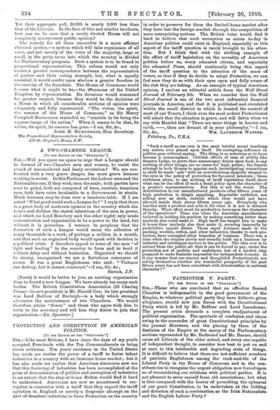PROTECTION AND CORRUPTION IN AMERICAN POLITICS.
[TO THE EDITOR 01 THE "SPECTATOR."]
Sra,—Like most Britons, I have since the days of my youth accepted Free-trade with the Ten Commandments as being above criticism. Ten years' residence in the United States has made me realise the power of a tariff to foster infant industries in a country with an immense home market ; but it has also made me realise that American statesmen now see that this fostering of industries has been accomplished at the price of demoralisation of politics and corruption of industries to an extent that the stay-at-home Briton would find it hard to understand. Americans are now so accustomed to cor- ruption in connexion with a tariff that they regard the tariff agitation in England as merely a desperate attempt on the part of decadent industries to force Protection on the country in order to preserve for them the limited home market after they have lost the foreign market through the competition of more enterprising nations. The British voter would find it hard to believe that such corruption as exists to-day in American politics could exist in England, especially as this aspect of the tariff question is rarely brought to his atten- tion. But I think that with the striking example of the effect of tariff legislation on the morality of American politics before us, every educated citizen, and especially the educated Press, should continually bring this aspect of the tariff question to the attention of the mass of voters, so that if they do decide to adopt Protection, we can feel sure they do so with their eyes open and fully aware of the risk they are taking. As an example of typical American opinion, I enclose an editorial article from the Wall Street .Tournal of February 5th. When we consider that the Wall Street Journal is one of the two most influential financial journals in America, and that it is published and circulated within the small district in which is located the control of most of our Trusts, I think even the most ardent Protectionist will admit that the situation is grave, and will listen when we say with Hamlet that "There are more things in heaven and earth, —, than are dreamt of in your • philosophy."—I am,
"Such a tariff as our own is the most baleful moral handicap any nation ever placed upon itself. Its corrupting influence in politics goes without saying. The thing is so notorious as to have become a commonplace. Childish efforts of men of ability like Senator Lodge, to prove that unnecessary duties upon food, to say nothing of other things, are no cause for high prices ; the frantic attempt in both Houses to appoint such investigating committees
s as hal be made 'safe' with an overwhelming majority steeped to the eyes in the policy of protection for favoured interests ; these evidences alone, to Bay nothing of tariff legislation itself, show what can be the effect of such a fiscal policy upon the character of a people's representatives. But this is not the worst. The deterioration in our manufactured products after fifteen years of high protection is simply appalling. Reputable outfitters are selling now as cloth, rubbish which they would not have allowed inside their stores fifteen years ago. Everybody who handles such a product and sells it for what it is not is debased thereby. 'What effect must its production have upon the character of the operatives ? Time was when the American manufacturer believed in holding_ his position by making something better than anybody else could make it. High tariff has taught him to make it worse than anybody else dare make it, securing immunity by prohibitive import duties. Those rapid fortunes made in the packing, woollen, cotton, and other industries, thanks to such pro- tection, have corrupted other branches of business. There was a time when the retailer slowly and soundly built up a business by industry and intelligent service to the public. The idea now is to extract from the public all that it can be forced to pay, under the protection not of probity and usefulness, but of a market ring prepared to make business impossible for independent honesty. Is it any wonder that our sincere and thoughtful Protectionists are asking themselves whether the wonderful prosperity of the past fifteen years has not been coincident with deterioration in national character?"










































 Previous page
Previous page